Organisational Behaviour Report: Tesco, Motivation, Teams
VerifiedAdded on 2020/10/23
|17
|5291
|392
Report
AI Summary
This report provides an in-depth analysis of organisational behaviour, focusing on the case study of Tesco. It begins with an introduction to organisational behaviour, followed by an examination of the impact of culture, power, and politics on employee behaviour. The report then delves into the role of motivation in achieving organisational objectives, exploring various motivational theories. It further investigates effective coordination and team development, examining relevant theories. Finally, the report evaluates different philosophies of organisational behaviour, offering critical insights into their relevance. The report highlights the interconnectedness of these elements and their collective influence on individual and organisational performance within the Tesco context, offering a comprehensive understanding of the subject matter.
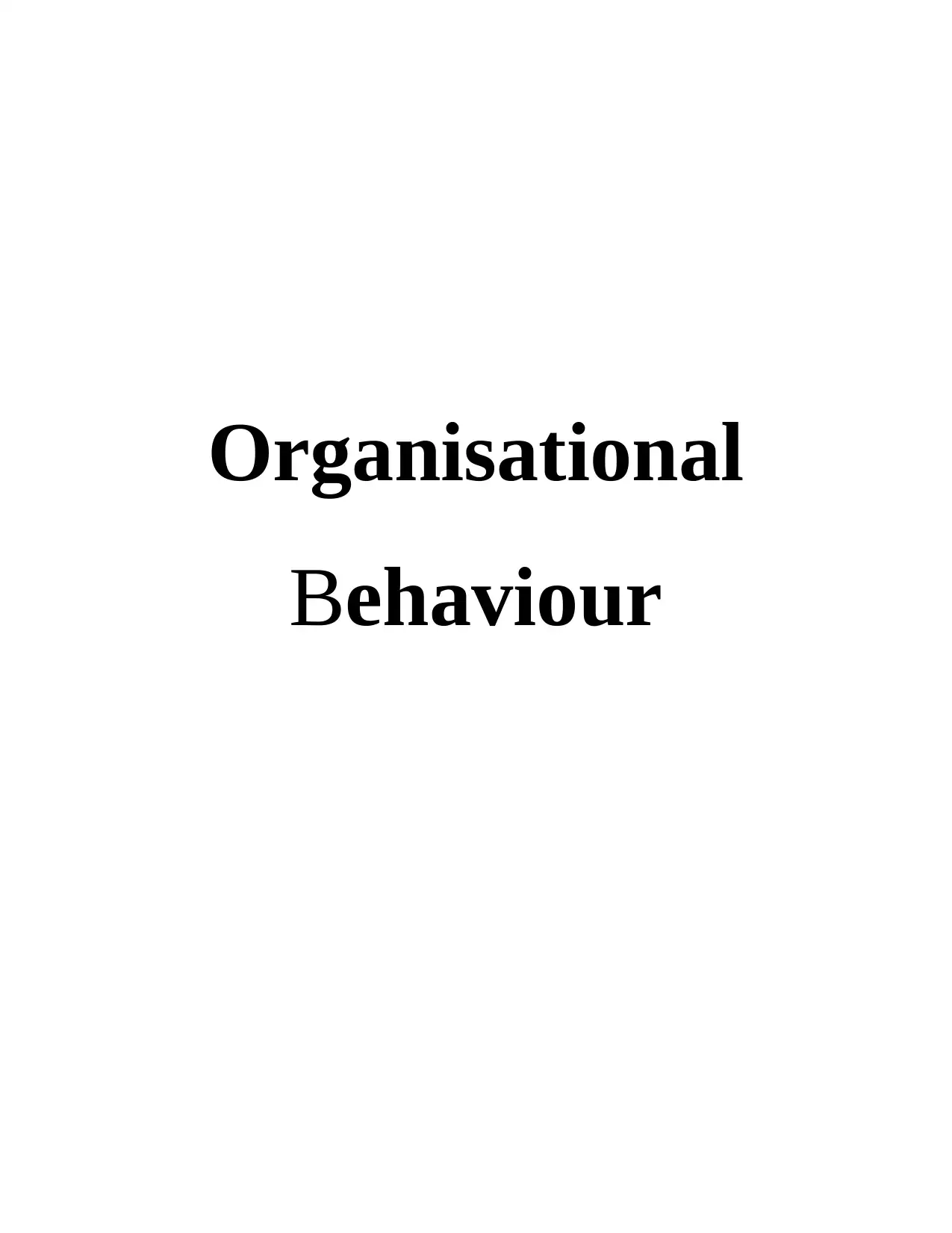
Organisational
Behaviour
Behaviour
Paraphrase This Document
Need a fresh take? Get an instant paraphrase of this document with our AI Paraphraser
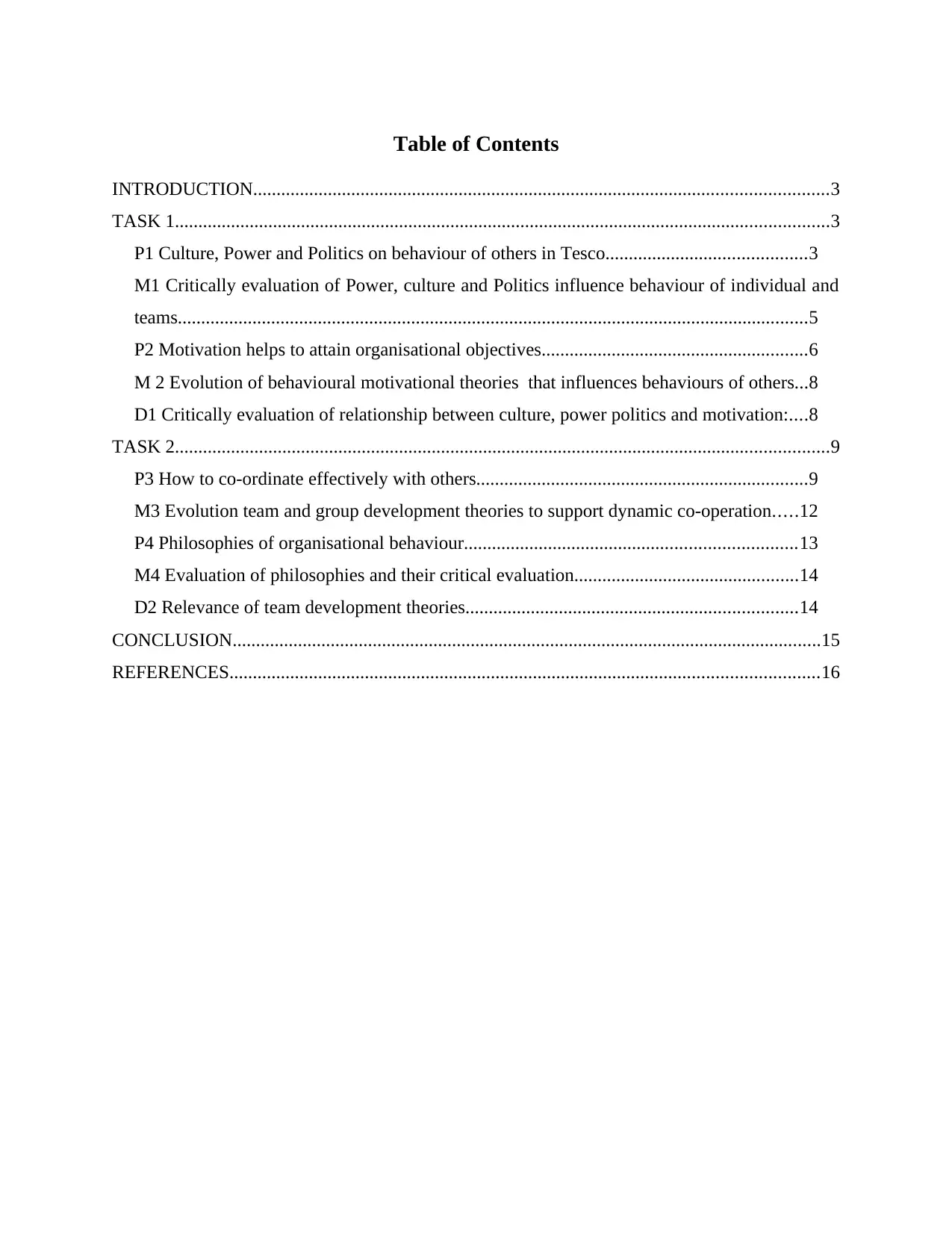
Table of Contents
INTRODUCTION...........................................................................................................................3
TASK 1............................................................................................................................................3
P1 Culture, Power and Politics on behaviour of others in Tesco...........................................3
M1 Critically evaluation of Power, culture and Politics influence behaviour of individual and
teams.......................................................................................................................................5
P2 Motivation helps to attain organisational objectives.........................................................6
M 2 Evolution of behavioural motivational theories that influences behaviours of others...8
D1 Critically evaluation of relationship between culture, power politics and motivation:....8
TASK 2............................................................................................................................................9
P3 How to co-ordinate effectively with others.......................................................................9
M3 Evolution team and group development theories to support dynamic co-operation.....12
P4 Philosophies of organisational behaviour.......................................................................13
M4 Evaluation of philosophies and their critical evaluation................................................14
D2 Relevance of team development theories.......................................................................14
CONCLUSION..............................................................................................................................15
REFERENCES..............................................................................................................................16
INTRODUCTION...........................................................................................................................3
TASK 1............................................................................................................................................3
P1 Culture, Power and Politics on behaviour of others in Tesco...........................................3
M1 Critically evaluation of Power, culture and Politics influence behaviour of individual and
teams.......................................................................................................................................5
P2 Motivation helps to attain organisational objectives.........................................................6
M 2 Evolution of behavioural motivational theories that influences behaviours of others...8
D1 Critically evaluation of relationship between culture, power politics and motivation:....8
TASK 2............................................................................................................................................9
P3 How to co-ordinate effectively with others.......................................................................9
M3 Evolution team and group development theories to support dynamic co-operation.....12
P4 Philosophies of organisational behaviour.......................................................................13
M4 Evaluation of philosophies and their critical evaluation................................................14
D2 Relevance of team development theories.......................................................................14
CONCLUSION..............................................................................................................................15
REFERENCES..............................................................................................................................16
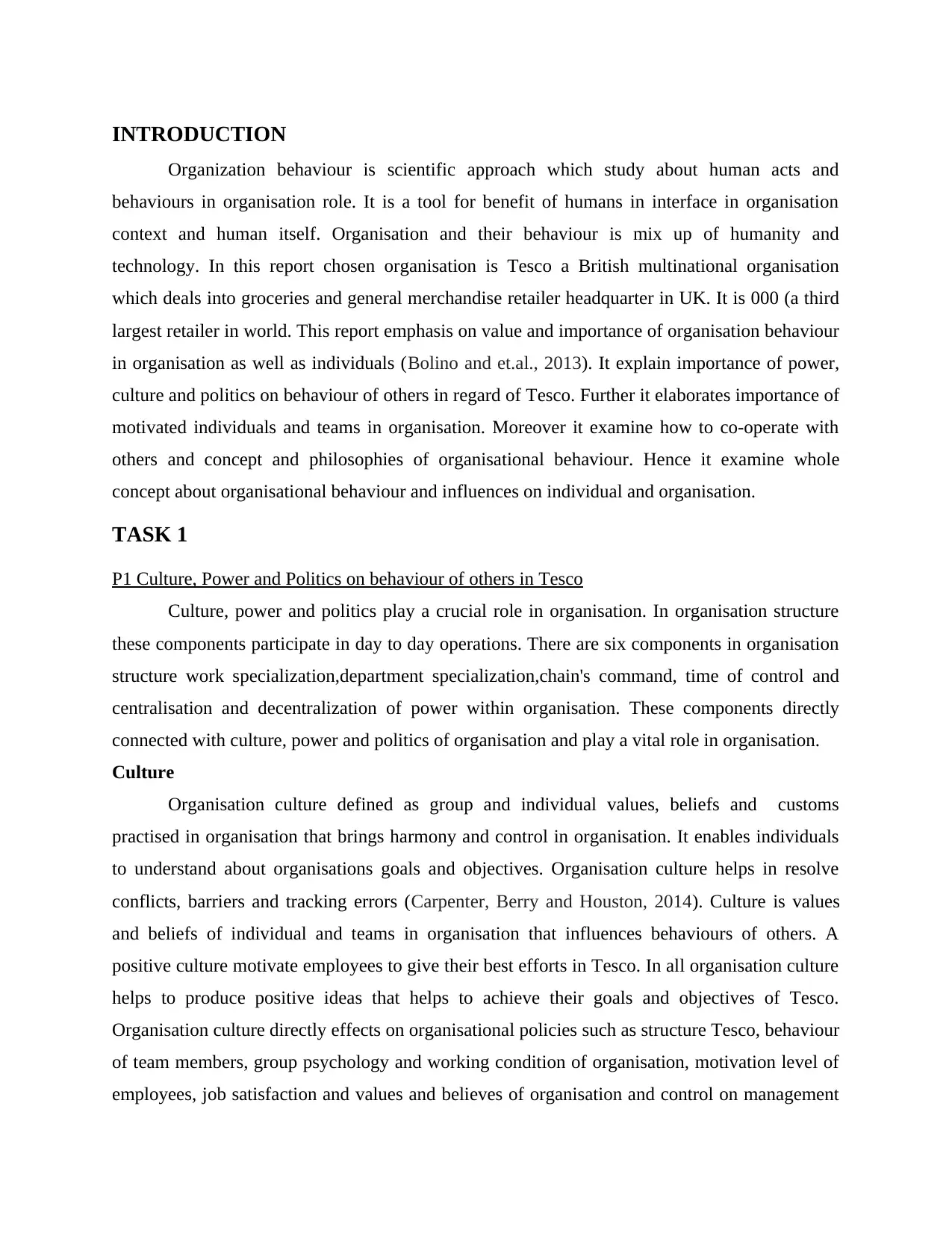
INTRODUCTION
Organization behaviour is scientific approach which study about human acts and
behaviours in organisation role. It is a tool for benefit of humans in interface in organisation
context and human itself. Organisation and their behaviour is mix up of humanity and
technology. In this report chosen organisation is Tesco a British multinational organisation
which deals into groceries and general merchandise retailer headquarter in UK. It is 000 (a third
largest retailer in world. This report emphasis on value and importance of organisation behaviour
in organisation as well as individuals (Bolino and et.al., 2013). It explain importance of power,
culture and politics on behaviour of others in regard of Tesco. Further it elaborates importance of
motivated individuals and teams in organisation. Moreover it examine how to co-operate with
others and concept and philosophies of organisational behaviour. Hence it examine whole
concept about organisational behaviour and influences on individual and organisation.
TASK 1
P1 Culture, Power and Politics on behaviour of others in Tesco
Culture, power and politics play a crucial role in organisation. In organisation structure
these components participate in day to day operations. There are six components in organisation
structure work specialization,department specialization,chain's command, time of control and
centralisation and decentralization of power within organisation. These components directly
connected with culture, power and politics of organisation and play a vital role in organisation.
Culture
Organisation culture defined as group and individual values, beliefs and customs
practised in organisation that brings harmony and control in organisation. It enables individuals
to understand about organisations goals and objectives. Organisation culture helps in resolve
conflicts, barriers and tracking errors (Carpenter, Berry and Houston, 2014). Culture is values
and beliefs of individual and teams in organisation that influences behaviours of others. A
positive culture motivate employees to give their best efforts in Tesco. In all organisation culture
helps to produce positive ideas that helps to achieve their goals and objectives of Tesco.
Organisation culture directly effects on organisational policies such as structure Tesco, behaviour
of team members, group psychology and working condition of organisation, motivation level of
employees, job satisfaction and values and believes of organisation and control on management
Organization behaviour is scientific approach which study about human acts and
behaviours in organisation role. It is a tool for benefit of humans in interface in organisation
context and human itself. Organisation and their behaviour is mix up of humanity and
technology. In this report chosen organisation is Tesco a British multinational organisation
which deals into groceries and general merchandise retailer headquarter in UK. It is 000 (a third
largest retailer in world. This report emphasis on value and importance of organisation behaviour
in organisation as well as individuals (Bolino and et.al., 2013). It explain importance of power,
culture and politics on behaviour of others in regard of Tesco. Further it elaborates importance of
motivated individuals and teams in organisation. Moreover it examine how to co-operate with
others and concept and philosophies of organisational behaviour. Hence it examine whole
concept about organisational behaviour and influences on individual and organisation.
TASK 1
P1 Culture, Power and Politics on behaviour of others in Tesco
Culture, power and politics play a crucial role in organisation. In organisation structure
these components participate in day to day operations. There are six components in organisation
structure work specialization,department specialization,chain's command, time of control and
centralisation and decentralization of power within organisation. These components directly
connected with culture, power and politics of organisation and play a vital role in organisation.
Culture
Organisation culture defined as group and individual values, beliefs and customs
practised in organisation that brings harmony and control in organisation. It enables individuals
to understand about organisations goals and objectives. Organisation culture helps in resolve
conflicts, barriers and tracking errors (Carpenter, Berry and Houston, 2014). Culture is values
and beliefs of individual and teams in organisation that influences behaviours of others. A
positive culture motivate employees to give their best efforts in Tesco. In all organisation culture
helps to produce positive ideas that helps to achieve their goals and objectives of Tesco.
Organisation culture directly effects on organisational policies such as structure Tesco, behaviour
of team members, group psychology and working condition of organisation, motivation level of
employees, job satisfaction and values and believes of organisation and control on management
⊘ This is a preview!⊘
Do you want full access?
Subscribe today to unlock all pages.

Trusted by 1+ million students worldwide
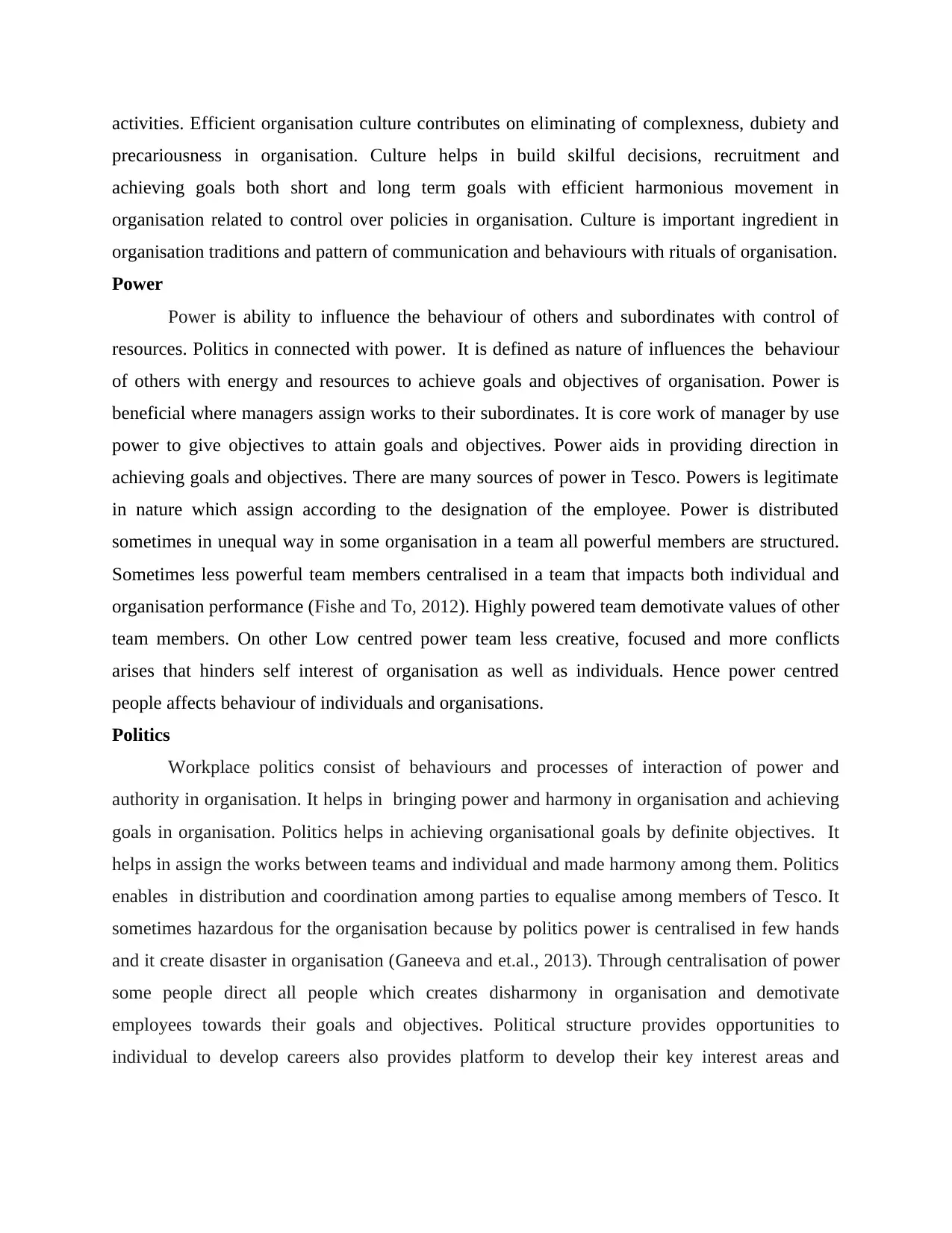
activities. Efficient organisation culture contributes on eliminating of complexness, dubiety and
precariousness in organisation. Culture helps in build skilful decisions, recruitment and
achieving goals both short and long term goals with efficient harmonious movement in
organisation related to control over policies in organisation. Culture is important ingredient in
organisation traditions and pattern of communication and behaviours with rituals of organisation.
Power
Power is ability to influence the behaviour of others and subordinates with control of
resources. Politics in connected with power. It is defined as nature of influences the behaviour
of others with energy and resources to achieve goals and objectives of organisation. Power is
beneficial where managers assign works to their subordinates. It is core work of manager by use
power to give objectives to attain goals and objectives. Power aids in providing direction in
achieving goals and objectives. There are many sources of power in Tesco. Powers is legitimate
in nature which assign according to the designation of the employee. Power is distributed
sometimes in unequal way in some organisation in a team all powerful members are structured.
Sometimes less powerful team members centralised in a team that impacts both individual and
organisation performance (Fishe and To, 2012). Highly powered team demotivate values of other
team members. On other Low centred power team less creative, focused and more conflicts
arises that hinders self interest of organisation as well as individuals. Hence power centred
people affects behaviour of individuals and organisations.
Politics
Workplace politics consist of behaviours and processes of interaction of power and
authority in organisation. It helps in bringing power and harmony in organisation and achieving
goals in organisation. Politics helps in achieving organisational goals by definite objectives. It
helps in assign the works between teams and individual and made harmony among them. Politics
enables in distribution and coordination among parties to equalise among members of Tesco. It
sometimes hazardous for the organisation because by politics power is centralised in few hands
and it create disaster in organisation (Ganeeva and et.al., 2013). Through centralisation of power
some people direct all people which creates disharmony in organisation and demotivate
employees towards their goals and objectives. Political structure provides opportunities to
individual to develop careers also provides platform to develop their key interest areas and
precariousness in organisation. Culture helps in build skilful decisions, recruitment and
achieving goals both short and long term goals with efficient harmonious movement in
organisation related to control over policies in organisation. Culture is important ingredient in
organisation traditions and pattern of communication and behaviours with rituals of organisation.
Power
Power is ability to influence the behaviour of others and subordinates with control of
resources. Politics in connected with power. It is defined as nature of influences the behaviour
of others with energy and resources to achieve goals and objectives of organisation. Power is
beneficial where managers assign works to their subordinates. It is core work of manager by use
power to give objectives to attain goals and objectives. Power aids in providing direction in
achieving goals and objectives. There are many sources of power in Tesco. Powers is legitimate
in nature which assign according to the designation of the employee. Power is distributed
sometimes in unequal way in some organisation in a team all powerful members are structured.
Sometimes less powerful team members centralised in a team that impacts both individual and
organisation performance (Fishe and To, 2012). Highly powered team demotivate values of other
team members. On other Low centred power team less creative, focused and more conflicts
arises that hinders self interest of organisation as well as individuals. Hence power centred
people affects behaviour of individuals and organisations.
Politics
Workplace politics consist of behaviours and processes of interaction of power and
authority in organisation. It helps in bringing power and harmony in organisation and achieving
goals in organisation. Politics helps in achieving organisational goals by definite objectives. It
helps in assign the works between teams and individual and made harmony among them. Politics
enables in distribution and coordination among parties to equalise among members of Tesco. It
sometimes hazardous for the organisation because by politics power is centralised in few hands
and it create disaster in organisation (Ganeeva and et.al., 2013). Through centralisation of power
some people direct all people which creates disharmony in organisation and demotivate
employees towards their goals and objectives. Political structure provides opportunities to
individual to develop careers also provides platform to develop their key interest areas and
Paraphrase This Document
Need a fresh take? Get an instant paraphrase of this document with our AI Paraphraser
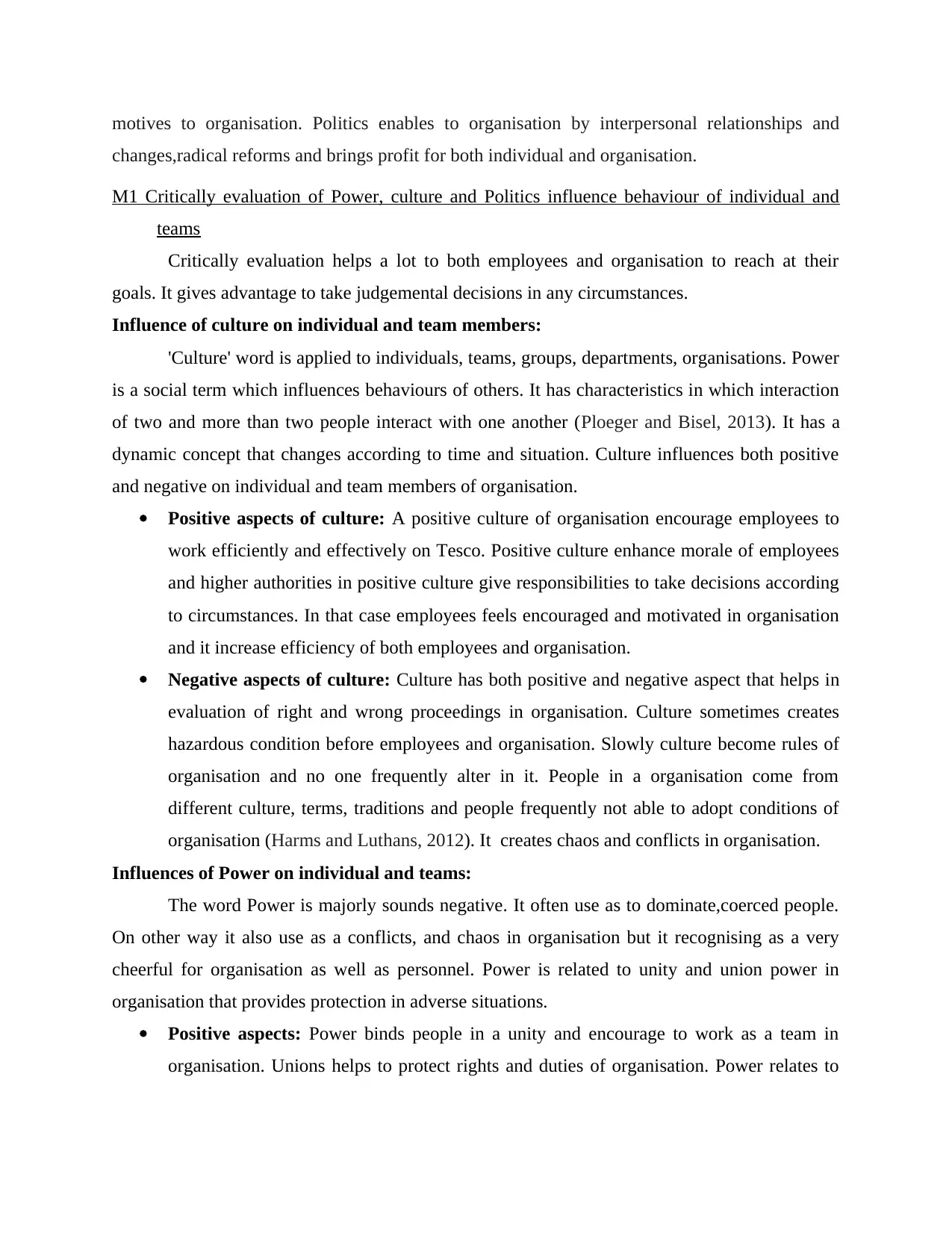
motives to organisation. Politics enables to organisation by interpersonal relationships and
changes,radical reforms and brings profit for both individual and organisation.
M1 Critically evaluation of Power, culture and Politics influence behaviour of individual and
teams
Critically evaluation helps a lot to both employees and organisation to reach at their
goals. It gives advantage to take judgemental decisions in any circumstances.
Influence of culture on individual and team members:
'Culture' word is applied to individuals, teams, groups, departments, organisations. Power
is a social term which influences behaviours of others. It has characteristics in which interaction
of two and more than two people interact with one another (Ploeger and Bisel, 2013). It has a
dynamic concept that changes according to time and situation. Culture influences both positive
and negative on individual and team members of organisation.
Positive aspects of culture: A positive culture of organisation encourage employees to
work efficiently and effectively on Tesco. Positive culture enhance morale of employees
and higher authorities in positive culture give responsibilities to take decisions according
to circumstances. In that case employees feels encouraged and motivated in organisation
and it increase efficiency of both employees and organisation.
Negative aspects of culture: Culture has both positive and negative aspect that helps in
evaluation of right and wrong proceedings in organisation. Culture sometimes creates
hazardous condition before employees and organisation. Slowly culture become rules of
organisation and no one frequently alter in it. People in a organisation come from
different culture, terms, traditions and people frequently not able to adopt conditions of
organisation (Harms and Luthans, 2012). It creates chaos and conflicts in organisation.
Influences of Power on individual and teams:
The word Power is majorly sounds negative. It often use as to dominate,coerced people.
On other way it also use as a conflicts, and chaos in organisation but it recognising as a very
cheerful for organisation as well as personnel. Power is related to unity and union power in
organisation that provides protection in adverse situations.
Positive aspects: Power binds people in a unity and encourage to work as a team in
organisation. Unions helps to protect rights and duties of organisation. Power relates to
changes,radical reforms and brings profit for both individual and organisation.
M1 Critically evaluation of Power, culture and Politics influence behaviour of individual and
teams
Critically evaluation helps a lot to both employees and organisation to reach at their
goals. It gives advantage to take judgemental decisions in any circumstances.
Influence of culture on individual and team members:
'Culture' word is applied to individuals, teams, groups, departments, organisations. Power
is a social term which influences behaviours of others. It has characteristics in which interaction
of two and more than two people interact with one another (Ploeger and Bisel, 2013). It has a
dynamic concept that changes according to time and situation. Culture influences both positive
and negative on individual and team members of organisation.
Positive aspects of culture: A positive culture of organisation encourage employees to
work efficiently and effectively on Tesco. Positive culture enhance morale of employees
and higher authorities in positive culture give responsibilities to take decisions according
to circumstances. In that case employees feels encouraged and motivated in organisation
and it increase efficiency of both employees and organisation.
Negative aspects of culture: Culture has both positive and negative aspect that helps in
evaluation of right and wrong proceedings in organisation. Culture sometimes creates
hazardous condition before employees and organisation. Slowly culture become rules of
organisation and no one frequently alter in it. People in a organisation come from
different culture, terms, traditions and people frequently not able to adopt conditions of
organisation (Harms and Luthans, 2012). It creates chaos and conflicts in organisation.
Influences of Power on individual and teams:
The word Power is majorly sounds negative. It often use as to dominate,coerced people.
On other way it also use as a conflicts, and chaos in organisation but it recognising as a very
cheerful for organisation as well as personnel. Power is related to unity and union power in
organisation that provides protection in adverse situations.
Positive aspects: Power binds people in a unity and encourage to work as a team in
organisation. Unions helps to protect rights and duties of organisation. Power relates to
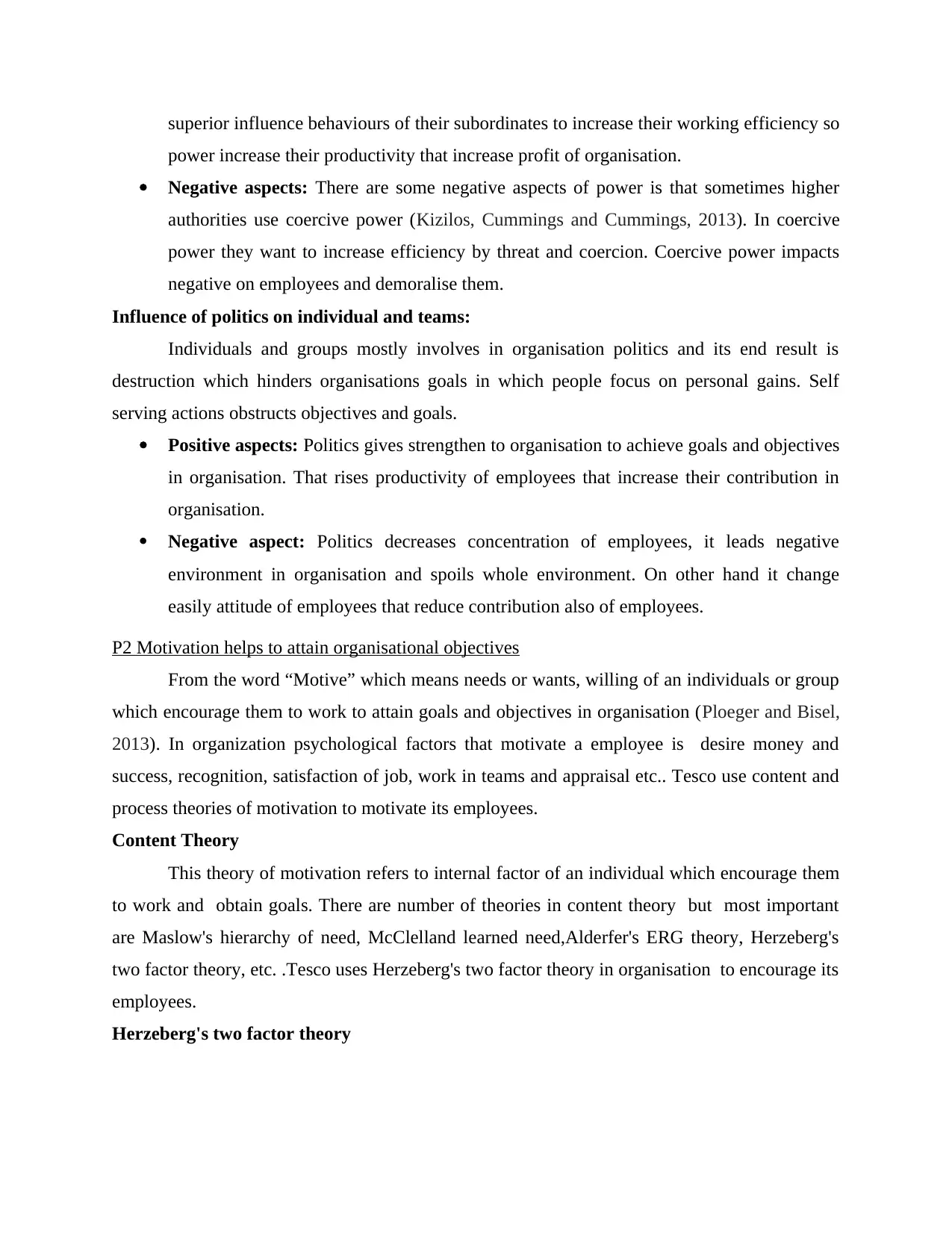
superior influence behaviours of their subordinates to increase their working efficiency so
power increase their productivity that increase profit of organisation.
Negative aspects: There are some negative aspects of power is that sometimes higher
authorities use coercive power (Kizilos, Cummings and Cummings, 2013). In coercive
power they want to increase efficiency by threat and coercion. Coercive power impacts
negative on employees and demoralise them.
Influence of politics on individual and teams:
Individuals and groups mostly involves in organisation politics and its end result is
destruction which hinders organisations goals in which people focus on personal gains. Self
serving actions obstructs objectives and goals.
Positive aspects: Politics gives strengthen to organisation to achieve goals and objectives
in organisation. That rises productivity of employees that increase their contribution in
organisation.
Negative aspect: Politics decreases concentration of employees, it leads negative
environment in organisation and spoils whole environment. On other hand it change
easily attitude of employees that reduce contribution also of employees.
P2 Motivation helps to attain organisational objectives
From the word “Motive” which means needs or wants, willing of an individuals or group
which encourage them to work to attain goals and objectives in organisation (Ploeger and Bisel,
2013). In organization psychological factors that motivate a employee is desire money and
success, recognition, satisfaction of job, work in teams and appraisal etc.. Tesco use content and
process theories of motivation to motivate its employees.
Content Theory
This theory of motivation refers to internal factor of an individual which encourage them
to work and obtain goals. There are number of theories in content theory but most important
are Maslow's hierarchy of need, McClelland learned need,Alderfer's ERG theory, Herzeberg's
two factor theory, etc. .Tesco uses Herzeberg's two factor theory in organisation to encourage its
employees.
Herzeberg's two factor theory
power increase their productivity that increase profit of organisation.
Negative aspects: There are some negative aspects of power is that sometimes higher
authorities use coercive power (Kizilos, Cummings and Cummings, 2013). In coercive
power they want to increase efficiency by threat and coercion. Coercive power impacts
negative on employees and demoralise them.
Influence of politics on individual and teams:
Individuals and groups mostly involves in organisation politics and its end result is
destruction which hinders organisations goals in which people focus on personal gains. Self
serving actions obstructs objectives and goals.
Positive aspects: Politics gives strengthen to organisation to achieve goals and objectives
in organisation. That rises productivity of employees that increase their contribution in
organisation.
Negative aspect: Politics decreases concentration of employees, it leads negative
environment in organisation and spoils whole environment. On other hand it change
easily attitude of employees that reduce contribution also of employees.
P2 Motivation helps to attain organisational objectives
From the word “Motive” which means needs or wants, willing of an individuals or group
which encourage them to work to attain goals and objectives in organisation (Ploeger and Bisel,
2013). In organization psychological factors that motivate a employee is desire money and
success, recognition, satisfaction of job, work in teams and appraisal etc.. Tesco use content and
process theories of motivation to motivate its employees.
Content Theory
This theory of motivation refers to internal factor of an individual which encourage them
to work and obtain goals. There are number of theories in content theory but most important
are Maslow's hierarchy of need, McClelland learned need,Alderfer's ERG theory, Herzeberg's
two factor theory, etc. .Tesco uses Herzeberg's two factor theory in organisation to encourage its
employees.
Herzeberg's two factor theory
⊘ This is a preview!⊘
Do you want full access?
Subscribe today to unlock all pages.

Trusted by 1+ million students worldwide
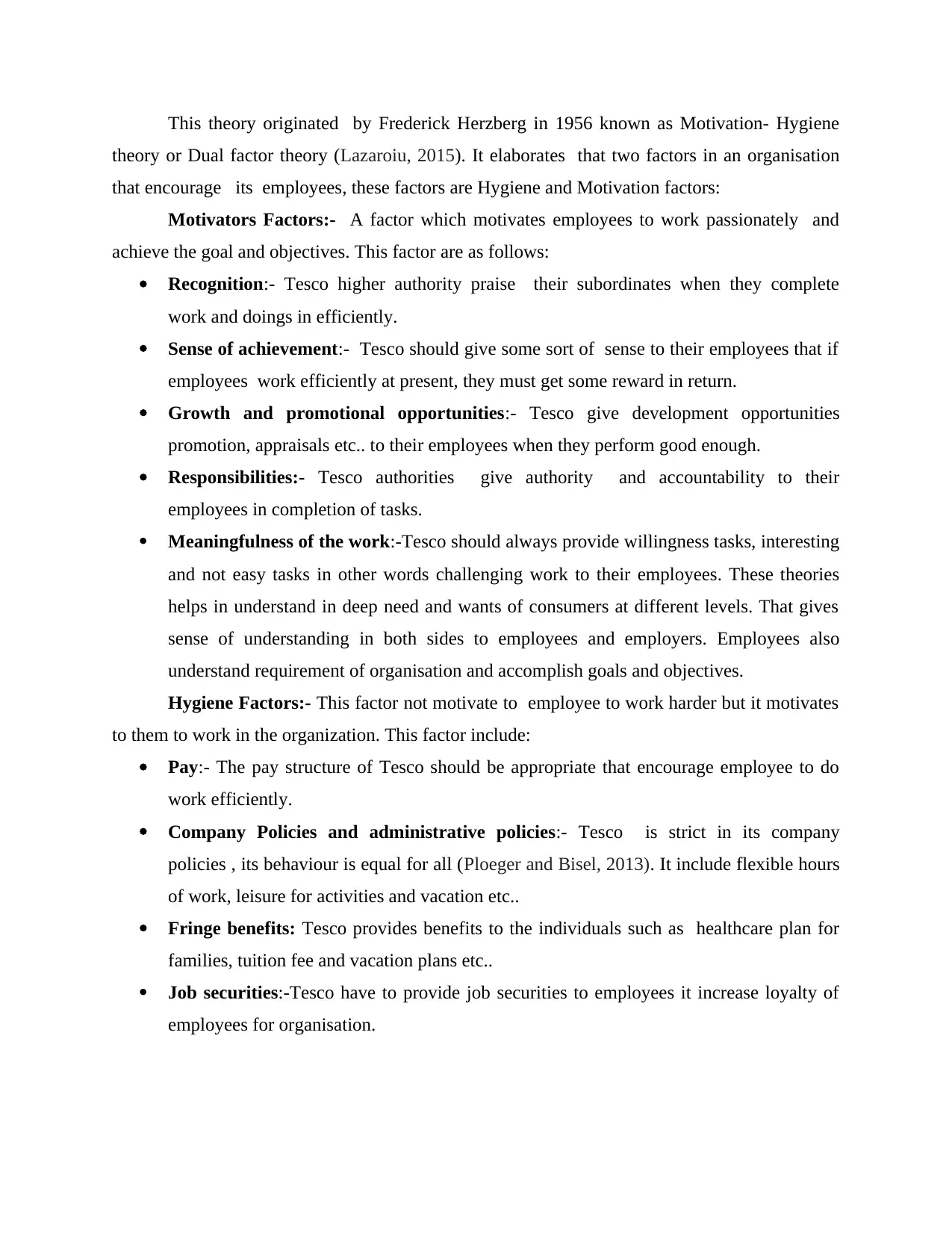
This theory originated by Frederick Herzberg in 1956 known as Motivation- Hygiene
theory or Dual factor theory (Lazaroiu, 2015). It elaborates that two factors in an organisation
that encourage its employees, these factors are Hygiene and Motivation factors:
Motivators Factors:- A factor which motivates employees to work passionately and
achieve the goal and objectives. This factor are as follows:
Recognition:- Tesco higher authority praise their subordinates when they complete
work and doings in efficiently.
Sense of achievement:- Tesco should give some sort of sense to their employees that if
employees work efficiently at present, they must get some reward in return.
Growth and promotional opportunities:- Tesco give development opportunities
promotion, appraisals etc.. to their employees when they perform good enough.
Responsibilities:- Tesco authorities give authority and accountability to their
employees in completion of tasks.
Meaningfulness of the work:-Tesco should always provide willingness tasks, interesting
and not easy tasks in other words challenging work to their employees. These theories
helps in understand in deep need and wants of consumers at different levels. That gives
sense of understanding in both sides to employees and employers. Employees also
understand requirement of organisation and accomplish goals and objectives.
Hygiene Factors:- This factor not motivate to employee to work harder but it motivates
to them to work in the organization. This factor include:
Pay:- The pay structure of Tesco should be appropriate that encourage employee to do
work efficiently.
Company Policies and administrative policies:- Tesco is strict in its company
policies , its behaviour is equal for all (Ploeger and Bisel, 2013). It include flexible hours
of work, leisure for activities and vacation etc..
Fringe benefits: Tesco provides benefits to the individuals such as healthcare plan for
families, tuition fee and vacation plans etc..
Job securities:-Tesco have to provide job securities to employees it increase loyalty of
employees for organisation.
theory or Dual factor theory (Lazaroiu, 2015). It elaborates that two factors in an organisation
that encourage its employees, these factors are Hygiene and Motivation factors:
Motivators Factors:- A factor which motivates employees to work passionately and
achieve the goal and objectives. This factor are as follows:
Recognition:- Tesco higher authority praise their subordinates when they complete
work and doings in efficiently.
Sense of achievement:- Tesco should give some sort of sense to their employees that if
employees work efficiently at present, they must get some reward in return.
Growth and promotional opportunities:- Tesco give development opportunities
promotion, appraisals etc.. to their employees when they perform good enough.
Responsibilities:- Tesco authorities give authority and accountability to their
employees in completion of tasks.
Meaningfulness of the work:-Tesco should always provide willingness tasks, interesting
and not easy tasks in other words challenging work to their employees. These theories
helps in understand in deep need and wants of consumers at different levels. That gives
sense of understanding in both sides to employees and employers. Employees also
understand requirement of organisation and accomplish goals and objectives.
Hygiene Factors:- This factor not motivate to employee to work harder but it motivates
to them to work in the organization. This factor include:
Pay:- The pay structure of Tesco should be appropriate that encourage employee to do
work efficiently.
Company Policies and administrative policies:- Tesco is strict in its company
policies , its behaviour is equal for all (Ploeger and Bisel, 2013). It include flexible hours
of work, leisure for activities and vacation etc..
Fringe benefits: Tesco provides benefits to the individuals such as healthcare plan for
families, tuition fee and vacation plans etc..
Job securities:-Tesco have to provide job securities to employees it increase loyalty of
employees for organisation.
Paraphrase This Document
Need a fresh take? Get an instant paraphrase of this document with our AI Paraphraser
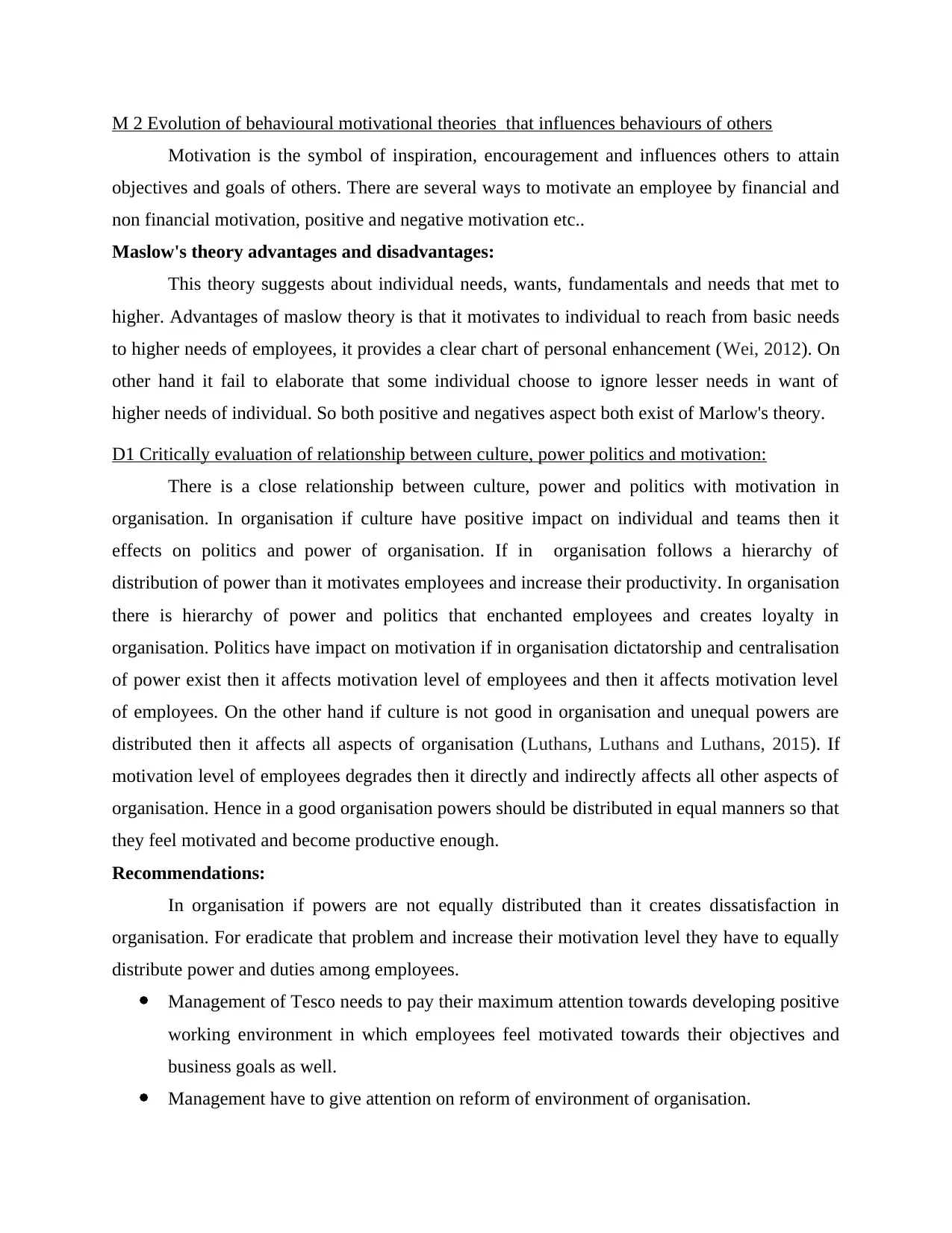
M 2 Evolution of behavioural motivational theories that influences behaviours of others
Motivation is the symbol of inspiration, encouragement and influences others to attain
objectives and goals of others. There are several ways to motivate an employee by financial and
non financial motivation, positive and negative motivation etc..
Maslow's theory advantages and disadvantages:
This theory suggests about individual needs, wants, fundamentals and needs that met to
higher. Advantages of maslow theory is that it motivates to individual to reach from basic needs
to higher needs of employees, it provides a clear chart of personal enhancement (Wei, 2012). On
other hand it fail to elaborate that some individual choose to ignore lesser needs in want of
higher needs of individual. So both positive and negatives aspect both exist of Marlow's theory.
D1 Critically evaluation of relationship between culture, power politics and motivation:
There is a close relationship between culture, power and politics with motivation in
organisation. In organisation if culture have positive impact on individual and teams then it
effects on politics and power of organisation. If in organisation follows a hierarchy of
distribution of power than it motivates employees and increase their productivity. In organisation
there is hierarchy of power and politics that enchanted employees and creates loyalty in
organisation. Politics have impact on motivation if in organisation dictatorship and centralisation
of power exist then it affects motivation level of employees and then it affects motivation level
of employees. On the other hand if culture is not good in organisation and unequal powers are
distributed then it affects all aspects of organisation (Luthans, Luthans and Luthans, 2015). If
motivation level of employees degrades then it directly and indirectly affects all other aspects of
organisation. Hence in a good organisation powers should be distributed in equal manners so that
they feel motivated and become productive enough.
Recommendations:
In organisation if powers are not equally distributed than it creates dissatisfaction in
organisation. For eradicate that problem and increase their motivation level they have to equally
distribute power and duties among employees.
Management of Tesco needs to pay their maximum attention towards developing positive
working environment in which employees feel motivated towards their objectives and
business goals as well.
Management have to give attention on reform of environment of organisation.
Motivation is the symbol of inspiration, encouragement and influences others to attain
objectives and goals of others. There are several ways to motivate an employee by financial and
non financial motivation, positive and negative motivation etc..
Maslow's theory advantages and disadvantages:
This theory suggests about individual needs, wants, fundamentals and needs that met to
higher. Advantages of maslow theory is that it motivates to individual to reach from basic needs
to higher needs of employees, it provides a clear chart of personal enhancement (Wei, 2012). On
other hand it fail to elaborate that some individual choose to ignore lesser needs in want of
higher needs of individual. So both positive and negatives aspect both exist of Marlow's theory.
D1 Critically evaluation of relationship between culture, power politics and motivation:
There is a close relationship between culture, power and politics with motivation in
organisation. In organisation if culture have positive impact on individual and teams then it
effects on politics and power of organisation. If in organisation follows a hierarchy of
distribution of power than it motivates employees and increase their productivity. In organisation
there is hierarchy of power and politics that enchanted employees and creates loyalty in
organisation. Politics have impact on motivation if in organisation dictatorship and centralisation
of power exist then it affects motivation level of employees and then it affects motivation level
of employees. On the other hand if culture is not good in organisation and unequal powers are
distributed then it affects all aspects of organisation (Luthans, Luthans and Luthans, 2015). If
motivation level of employees degrades then it directly and indirectly affects all other aspects of
organisation. Hence in a good organisation powers should be distributed in equal manners so that
they feel motivated and become productive enough.
Recommendations:
In organisation if powers are not equally distributed than it creates dissatisfaction in
organisation. For eradicate that problem and increase their motivation level they have to equally
distribute power and duties among employees.
Management of Tesco needs to pay their maximum attention towards developing positive
working environment in which employees feel motivated towards their objectives and
business goals as well.
Management have to give attention on reform of environment of organisation.
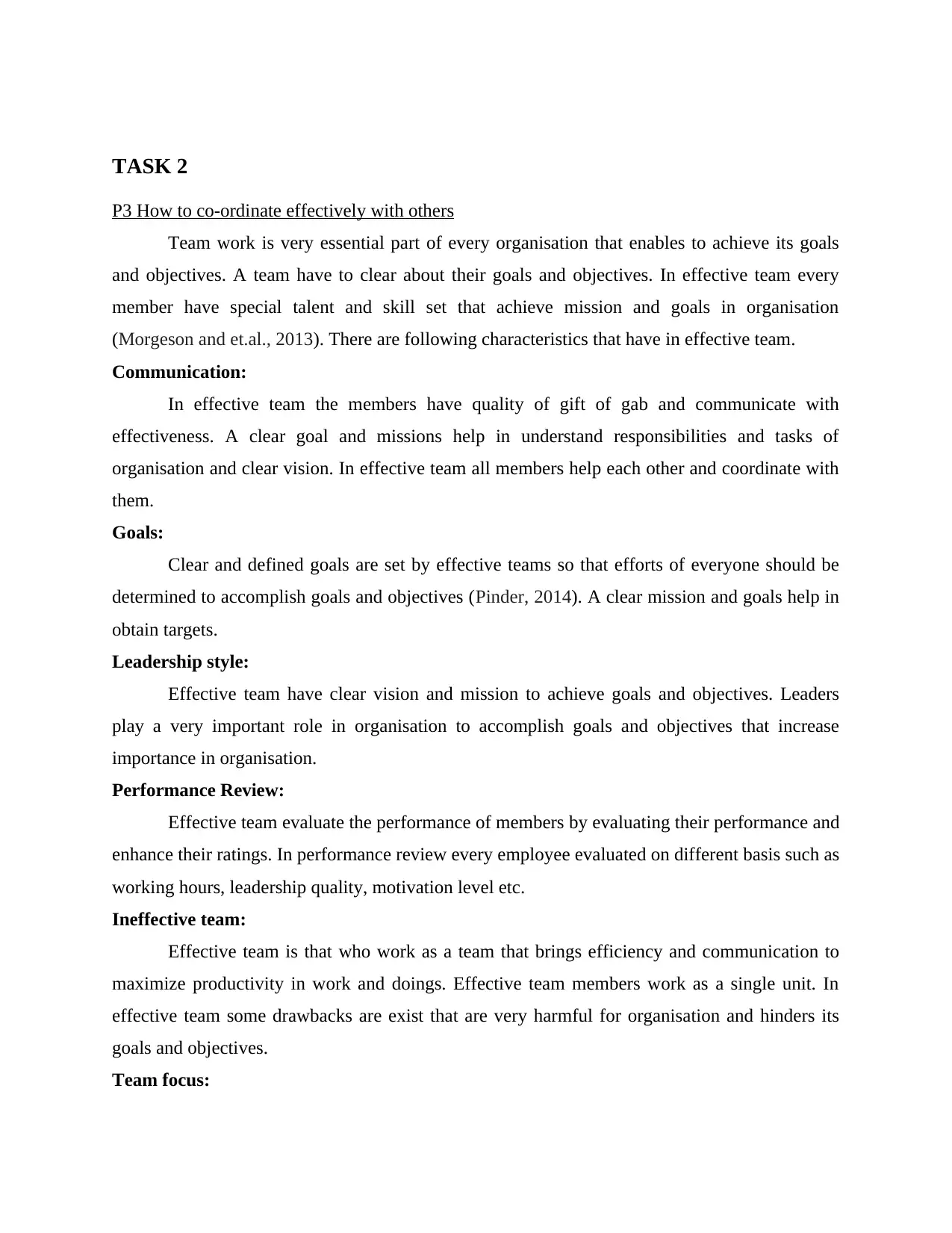
TASK 2
P3 How to co-ordinate effectively with others
Team work is very essential part of every organisation that enables to achieve its goals
and objectives. A team have to clear about their goals and objectives. In effective team every
member have special talent and skill set that achieve mission and goals in organisation
(Morgeson and et.al., 2013). There are following characteristics that have in effective team.
Communication:
In effective team the members have quality of gift of gab and communicate with
effectiveness. A clear goal and missions help in understand responsibilities and tasks of
organisation and clear vision. In effective team all members help each other and coordinate with
them.
Goals:
Clear and defined goals are set by effective teams so that efforts of everyone should be
determined to accomplish goals and objectives (Pinder, 2014). A clear mission and goals help in
obtain targets.
Leadership style:
Effective team have clear vision and mission to achieve goals and objectives. Leaders
play a very important role in organisation to accomplish goals and objectives that increase
importance in organisation.
Performance Review:
Effective team evaluate the performance of members by evaluating their performance and
enhance their ratings. In performance review every employee evaluated on different basis such as
working hours, leadership quality, motivation level etc.
Ineffective team:
Effective team is that who work as a team that brings efficiency and communication to
maximize productivity in work and doings. Effective team members work as a single unit. In
effective team some drawbacks are exist that are very harmful for organisation and hinders its
goals and objectives.
Team focus:
P3 How to co-ordinate effectively with others
Team work is very essential part of every organisation that enables to achieve its goals
and objectives. A team have to clear about their goals and objectives. In effective team every
member have special talent and skill set that achieve mission and goals in organisation
(Morgeson and et.al., 2013). There are following characteristics that have in effective team.
Communication:
In effective team the members have quality of gift of gab and communicate with
effectiveness. A clear goal and missions help in understand responsibilities and tasks of
organisation and clear vision. In effective team all members help each other and coordinate with
them.
Goals:
Clear and defined goals are set by effective teams so that efforts of everyone should be
determined to accomplish goals and objectives (Pinder, 2014). A clear mission and goals help in
obtain targets.
Leadership style:
Effective team have clear vision and mission to achieve goals and objectives. Leaders
play a very important role in organisation to accomplish goals and objectives that increase
importance in organisation.
Performance Review:
Effective team evaluate the performance of members by evaluating their performance and
enhance their ratings. In performance review every employee evaluated on different basis such as
working hours, leadership quality, motivation level etc.
Ineffective team:
Effective team is that who work as a team that brings efficiency and communication to
maximize productivity in work and doings. Effective team members work as a single unit. In
effective team some drawbacks are exist that are very harmful for organisation and hinders its
goals and objectives.
Team focus:
⊘ This is a preview!⊘
Do you want full access?
Subscribe today to unlock all pages.

Trusted by 1+ million students worldwide
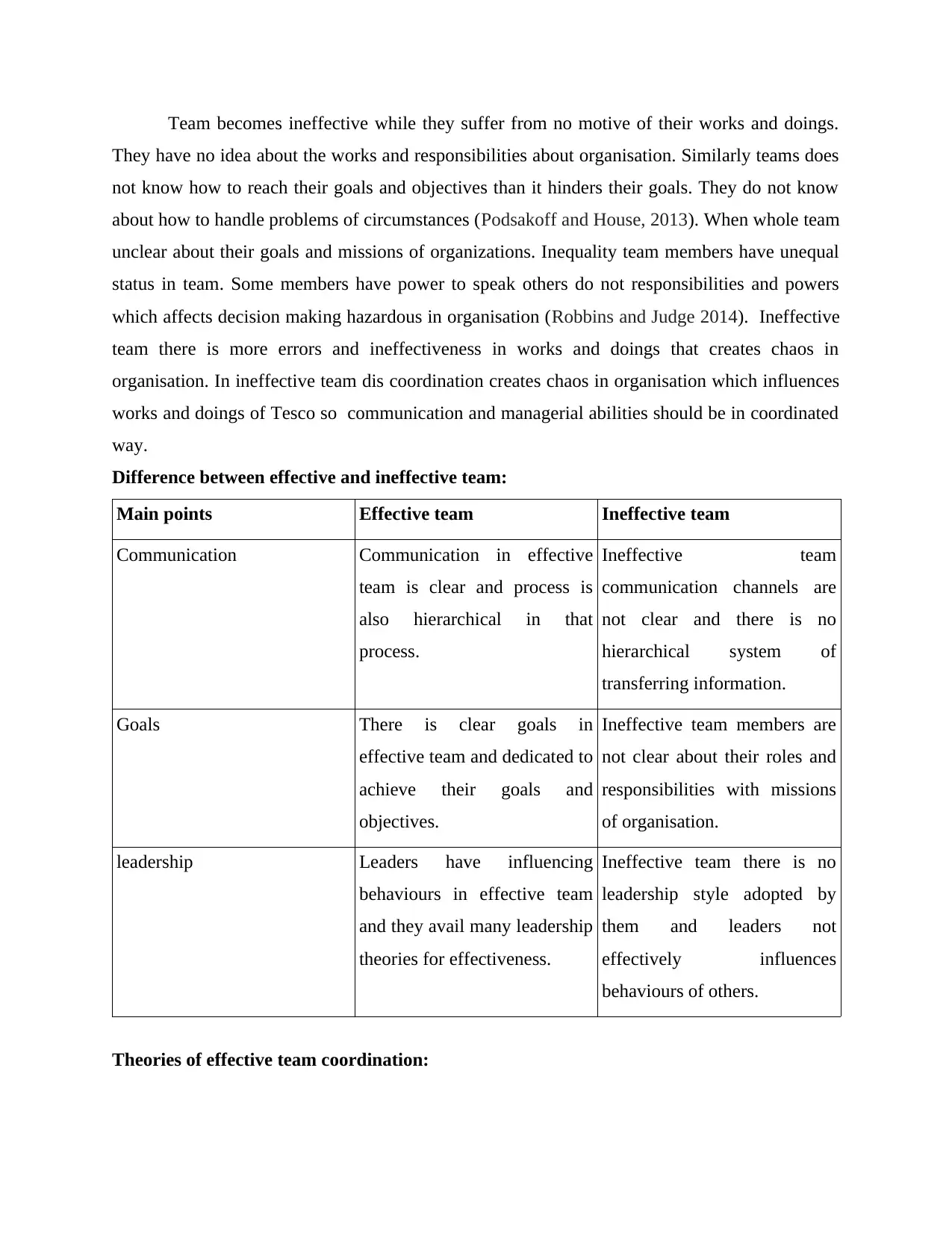
Team becomes ineffective while they suffer from no motive of their works and doings.
They have no idea about the works and responsibilities about organisation. Similarly teams does
not know how to reach their goals and objectives than it hinders their goals. They do not know
about how to handle problems of circumstances (Podsakoff and House, 2013). When whole team
unclear about their goals and missions of organizations. Inequality team members have unequal
status in team. Some members have power to speak others do not responsibilities and powers
which affects decision making hazardous in organisation (Robbins and Judge 2014). Ineffective
team there is more errors and ineffectiveness in works and doings that creates chaos in
organisation. In ineffective team dis coordination creates chaos in organisation which influences
works and doings of Tesco so communication and managerial abilities should be in coordinated
way.
Difference between effective and ineffective team:
Main points Effective team Ineffective team
Communication Communication in effective
team is clear and process is
also hierarchical in that
process.
Ineffective team
communication channels are
not clear and there is no
hierarchical system of
transferring information.
Goals There is clear goals in
effective team and dedicated to
achieve their goals and
objectives.
Ineffective team members are
not clear about their roles and
responsibilities with missions
of organisation.
leadership Leaders have influencing
behaviours in effective team
and they avail many leadership
theories for effectiveness.
Ineffective team there is no
leadership style adopted by
them and leaders not
effectively influences
behaviours of others.
Theories of effective team coordination:
They have no idea about the works and responsibilities about organisation. Similarly teams does
not know how to reach their goals and objectives than it hinders their goals. They do not know
about how to handle problems of circumstances (Podsakoff and House, 2013). When whole team
unclear about their goals and missions of organizations. Inequality team members have unequal
status in team. Some members have power to speak others do not responsibilities and powers
which affects decision making hazardous in organisation (Robbins and Judge 2014). Ineffective
team there is more errors and ineffectiveness in works and doings that creates chaos in
organisation. In ineffective team dis coordination creates chaos in organisation which influences
works and doings of Tesco so communication and managerial abilities should be in coordinated
way.
Difference between effective and ineffective team:
Main points Effective team Ineffective team
Communication Communication in effective
team is clear and process is
also hierarchical in that
process.
Ineffective team
communication channels are
not clear and there is no
hierarchical system of
transferring information.
Goals There is clear goals in
effective team and dedicated to
achieve their goals and
objectives.
Ineffective team members are
not clear about their roles and
responsibilities with missions
of organisation.
leadership Leaders have influencing
behaviours in effective team
and they avail many leadership
theories for effectiveness.
Ineffective team there is no
leadership style adopted by
them and leaders not
effectively influences
behaviours of others.
Theories of effective team coordination:
Paraphrase This Document
Need a fresh take? Get an instant paraphrase of this document with our AI Paraphraser
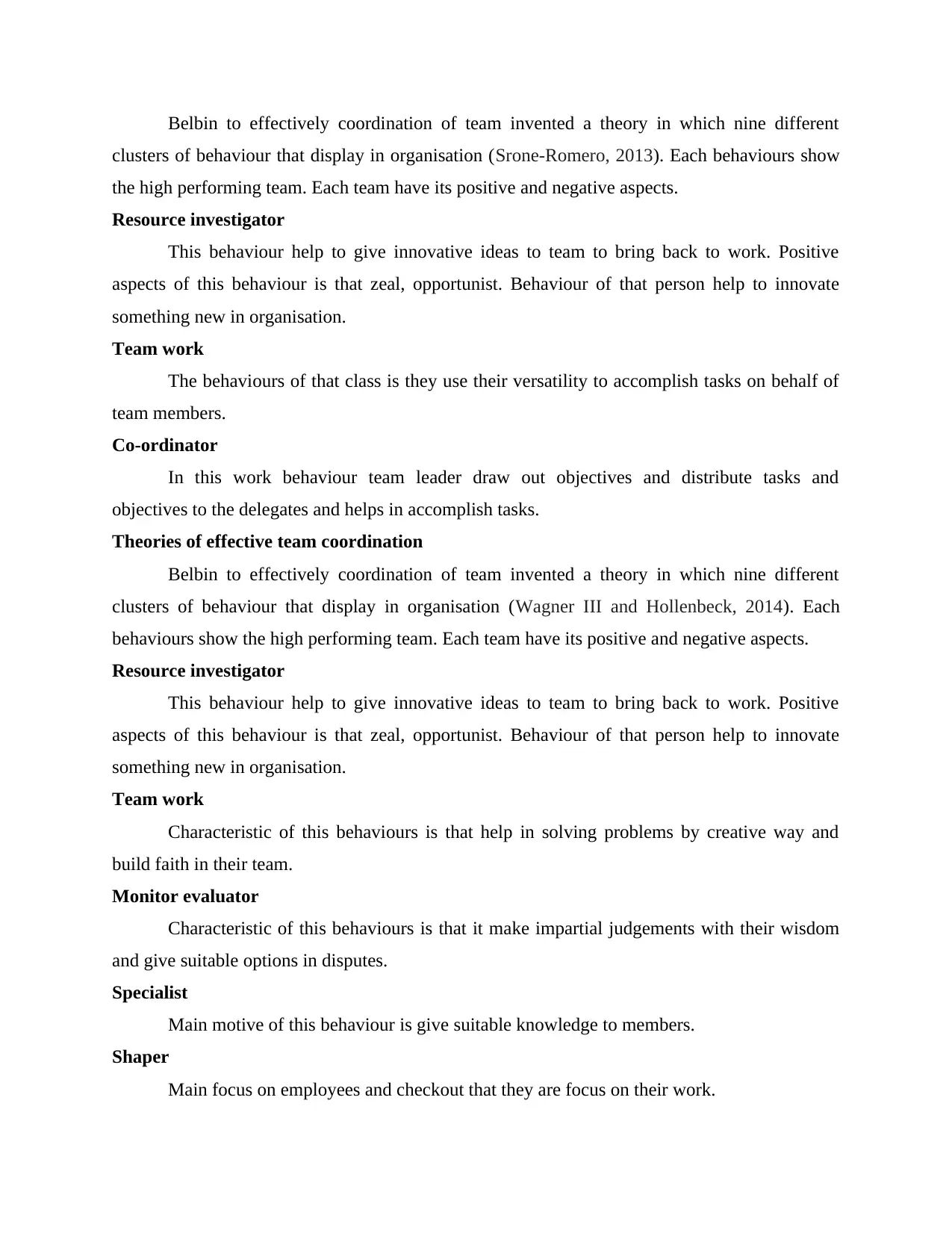
Belbin to effectively coordination of team invented a theory in which nine different
clusters of behaviour that display in organisation (Srone-Romero, 2013). Each behaviours show
the high performing team. Each team have its positive and negative aspects.
Resource investigator
This behaviour help to give innovative ideas to team to bring back to work. Positive
aspects of this behaviour is that zeal, opportunist. Behaviour of that person help to innovate
something new in organisation.
Team work
The behaviours of that class is they use their versatility to accomplish tasks on behalf of
team members.
Co-ordinator
In this work behaviour team leader draw out objectives and distribute tasks and
objectives to the delegates and helps in accomplish tasks.
Theories of effective team coordination
Belbin to effectively coordination of team invented a theory in which nine different
clusters of behaviour that display in organisation (Wagner III and Hollenbeck, 2014). Each
behaviours show the high performing team. Each team have its positive and negative aspects.
Resource investigator
This behaviour help to give innovative ideas to team to bring back to work. Positive
aspects of this behaviour is that zeal, opportunist. Behaviour of that person help to innovate
something new in organisation.
Team work
Characteristic of this behaviours is that help in solving problems by creative way and
build faith in their team.
Monitor evaluator
Characteristic of this behaviours is that it make impartial judgements with their wisdom
and give suitable options in disputes.
Specialist
Main motive of this behaviour is give suitable knowledge to members.
Shaper
Main focus on employees and checkout that they are focus on their work.
clusters of behaviour that display in organisation (Srone-Romero, 2013). Each behaviours show
the high performing team. Each team have its positive and negative aspects.
Resource investigator
This behaviour help to give innovative ideas to team to bring back to work. Positive
aspects of this behaviour is that zeal, opportunist. Behaviour of that person help to innovate
something new in organisation.
Team work
The behaviours of that class is they use their versatility to accomplish tasks on behalf of
team members.
Co-ordinator
In this work behaviour team leader draw out objectives and distribute tasks and
objectives to the delegates and helps in accomplish tasks.
Theories of effective team coordination
Belbin to effectively coordination of team invented a theory in which nine different
clusters of behaviour that display in organisation (Wagner III and Hollenbeck, 2014). Each
behaviours show the high performing team. Each team have its positive and negative aspects.
Resource investigator
This behaviour help to give innovative ideas to team to bring back to work. Positive
aspects of this behaviour is that zeal, opportunist. Behaviour of that person help to innovate
something new in organisation.
Team work
Characteristic of this behaviours is that help in solving problems by creative way and
build faith in their team.
Monitor evaluator
Characteristic of this behaviours is that it make impartial judgements with their wisdom
and give suitable options in disputes.
Specialist
Main motive of this behaviour is give suitable knowledge to members.
Shaper
Main focus on employees and checkout that they are focus on their work.
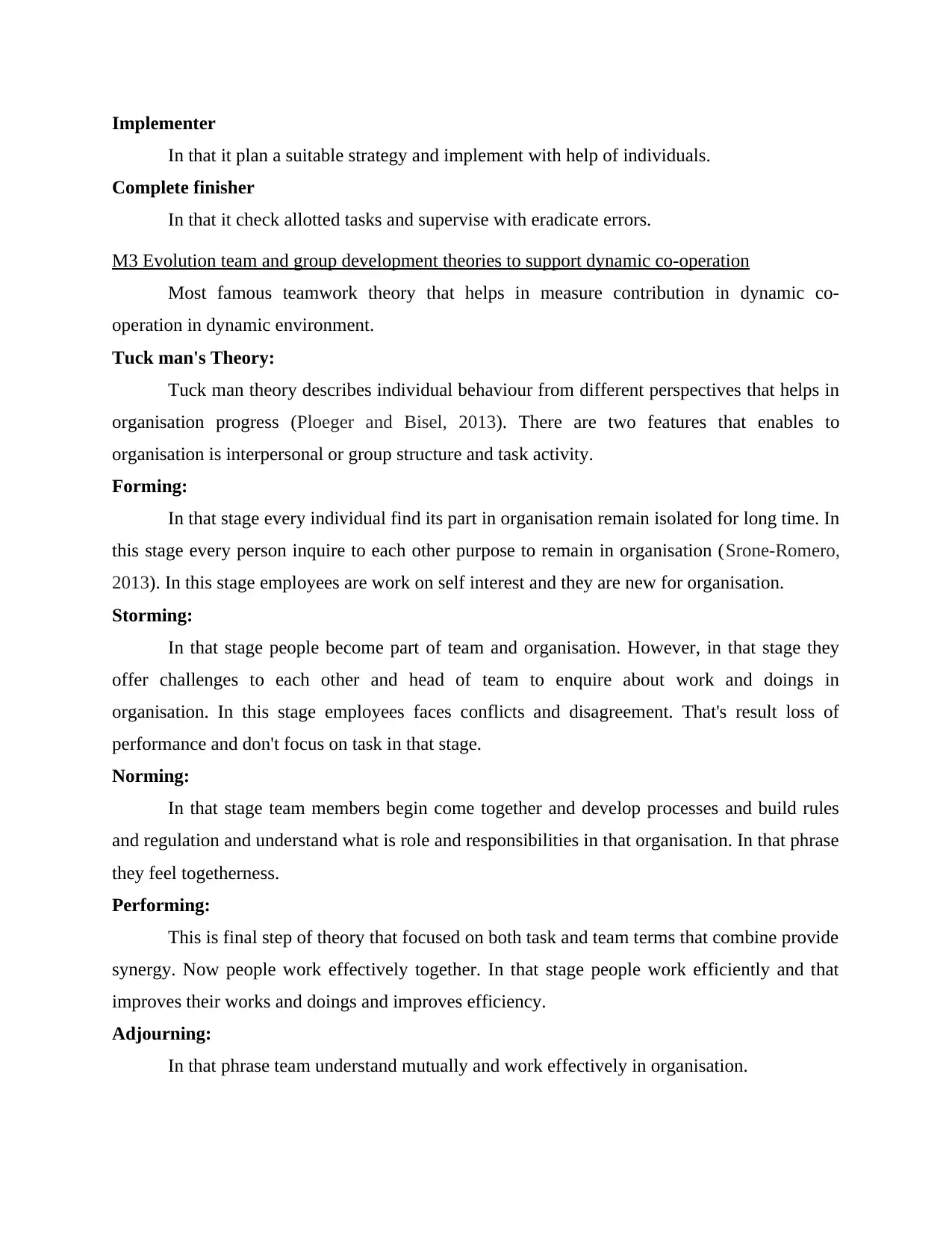
Implementer
In that it plan a suitable strategy and implement with help of individuals.
Complete finisher
In that it check allotted tasks and supervise with eradicate errors.
M3 Evolution team and group development theories to support dynamic co-operation
Most famous teamwork theory that helps in measure contribution in dynamic co-
operation in dynamic environment.
Tuck man's Theory:
Tuck man theory describes individual behaviour from different perspectives that helps in
organisation progress (Ploeger and Bisel, 2013). There are two features that enables to
organisation is interpersonal or group structure and task activity.
Forming:
In that stage every individual find its part in organisation remain isolated for long time. In
this stage every person inquire to each other purpose to remain in organisation (Srone-Romero,
2013). In this stage employees are work on self interest and they are new for organisation.
Storming:
In that stage people become part of team and organisation. However, in that stage they
offer challenges to each other and head of team to enquire about work and doings in
organisation. In this stage employees faces conflicts and disagreement. That's result loss of
performance and don't focus on task in that stage.
Norming:
In that stage team members begin come together and develop processes and build rules
and regulation and understand what is role and responsibilities in that organisation. In that phrase
they feel togetherness.
Performing:
This is final step of theory that focused on both task and team terms that combine provide
synergy. Now people work effectively together. In that stage people work efficiently and that
improves their works and doings and improves efficiency.
Adjourning:
In that phrase team understand mutually and work effectively in organisation.
In that it plan a suitable strategy and implement with help of individuals.
Complete finisher
In that it check allotted tasks and supervise with eradicate errors.
M3 Evolution team and group development theories to support dynamic co-operation
Most famous teamwork theory that helps in measure contribution in dynamic co-
operation in dynamic environment.
Tuck man's Theory:
Tuck man theory describes individual behaviour from different perspectives that helps in
organisation progress (Ploeger and Bisel, 2013). There are two features that enables to
organisation is interpersonal or group structure and task activity.
Forming:
In that stage every individual find its part in organisation remain isolated for long time. In
this stage every person inquire to each other purpose to remain in organisation (Srone-Romero,
2013). In this stage employees are work on self interest and they are new for organisation.
Storming:
In that stage people become part of team and organisation. However, in that stage they
offer challenges to each other and head of team to enquire about work and doings in
organisation. In this stage employees faces conflicts and disagreement. That's result loss of
performance and don't focus on task in that stage.
Norming:
In that stage team members begin come together and develop processes and build rules
and regulation and understand what is role and responsibilities in that organisation. In that phrase
they feel togetherness.
Performing:
This is final step of theory that focused on both task and team terms that combine provide
synergy. Now people work effectively together. In that stage people work efficiently and that
improves their works and doings and improves efficiency.
Adjourning:
In that phrase team understand mutually and work effectively in organisation.
⊘ This is a preview!⊘
Do you want full access?
Subscribe today to unlock all pages.

Trusted by 1+ million students worldwide
1 out of 17
Related Documents
Your All-in-One AI-Powered Toolkit for Academic Success.
+13062052269
info@desklib.com
Available 24*7 on WhatsApp / Email
![[object Object]](/_next/static/media/star-bottom.7253800d.svg)
Unlock your academic potential
Copyright © 2020–2026 A2Z Services. All Rights Reserved. Developed and managed by ZUCOL.





